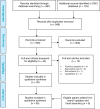Perspectives of Pregnant People and Clinicians on Noninvasive Prenatal Testing: A Systematic Review and Qualitative Meta-synthesis
- PMID: 30838086
- PMCID: PMC6398533
Perspectives of Pregnant People and Clinicians on Noninvasive Prenatal Testing: A Systematic Review and Qualitative Meta-synthesis
Abstract
Background: Pregnant people have a risk of carrying a fetus affected by a chromosomal anomaly. Prenatal screening is offered to pregnant people to assess their risk. In recent years, noninvasive prenatal testing (NIPT) has been introduced clinically, which uses the presence of circulating cell-free fetal DNA in the maternal blood to quantify the risk of a chromosomal anomaly. At present, NIPT is publicly funded for pregnancies at high risk of a chromosomal anomaly, and available to pregnant people at average risk if they choose to pay out of pocket.
Methods: We performed a systematic review of primary, empirical qualitative research that describes the experiences and perspectives of pregnant people, their families, clinicians, and others with lived experience relevant to NIPT. We were interested in the beliefs, experiences, preferences, and perspectives of these groups. We analyzed the evidence available in 36 qualitative and mixed-methods studies using the integrative technique of qualitative meta-synthesis.
Results: Most people (pregnant people, clinicians, and others with relevant lived experience) said that NIPT offered important information to pregnant people and their partners. Most people were very enthusiastic about widening access to NIPT because it can provide information about chromosomal anomalies quite early in pregnancy, with relatively high accuracy, and without risk of procedure-related pregnancy loss. However, many groups cautioned that widening access to NIPT may result in routinization of this test, causing potential harm to pregnant people, their families, the health care system, people living with disabilities, and society as a whole. Widened logistical, financial, emotional, and informational access may be perceived as a benefit, but it can also confer harm on various groups. Many of these challenges echo historical critiques of other forms of prenatal testing, with some issues mitigated or exacerbated by the particular features of NIPT.
Conclusions: Noninvasive prenatal testing offers significant benefit for pregnant people but may also be associated with potential harms related to informed decision-making, inequitable use, social pressure to test, and reduced support for people with disabilities.
References
-
- Ariosa Diagnostics. Harmony prenatal test [Internet]. San Jose (CA): F. Hoffman-La Roche Ltd.; 2017. [cited 2018 Jun 19]. Available from: http://www.ariosadx.com/healthcare-professionals
-
- Natera Inc. About Panorama [Internet]. San Carlos (CA): Natera Inc.; 2017. [cited 2018 Jun 19]. Available from: https://www.natera.com/panorama-test/clinical-information
-
- Audibert F, De Bie I, Johnson JA, Okun N, Wilson RD, Armour C, et al. No. 348-Joint SOGC-CCMG guideline: update on prenatal screening for fetal aneuploidy, fetal anomalies, and adverse pregnancy outcomes. J Obstet Gynaecol Can. 2017;39(9):805–17. - PubMed
-
- Vanstone M, Giacomini M, Nisker J. Non-invasive prenatal testing [Internet]. Ottawa (ON): Royal College of Physicians and Surgeons of Canada; 2017. [cited 2017 Apr 10]. Available from: http://www.royalcollege.ca/rcsite/bioethics/cases/section-4/non-invasive...
Publication types
MeSH terms
LinkOut - more resources
Full Text Sources
Medical

